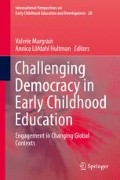Abstract
This chapter reports findings of life story interviews with Swedish immigrant children aged 9–13 from non-urban areas, reflecting on their younger childhood experiences of belonging, relationships with other children and friendship negotiation. Some of the children were newly arrived, and some of them were born in Sweden. Using Corsaro’s (The sociology of childhood, 3rd edn. Pine Forge Press, Thousand Oaks, CA, 2011) concept of peer culture as theoretical framework and analytical tool, the premise of the chapter is that preschools, schools and other education arenas play a central role in society through their mandate to foster children as democratic citizens. Studying the conditions and opportunities available to the children in these education arenas promotes understanding of which individuals and groups are included and which are excluded in differing contexts, thus making issues of power visible. The results of the study show that establishing relationships with friends involves extensive relational and emotional effort. The children describe what it is like to have and not to have friends and how adults are and are not included. The narratives display several aspects of how entering into comradeship is conditional and connected to immigrant conditions and also to the local community codes, for example, religious and cultural meeting places.
Access this chapter
Tax calculation will be finalised at checkout
Purchases are for personal use only
References
Bliding, M. (2004). Inneslutandets och uteslutandets praktik: en studie av barns relationsarbete i skolan. Doktorsavhandling, Göteborg, Sweden: Acta Universitatis.
Bruner, J. S. (1990). Acts of meaning. Cambridge, MA: Harvard University Press.
Corsaro, W. (1985). Friendship and peer culture in the early years. Norwood, NY: Ablex Publishing Corporation.
Corsaro, W. (2011). The sociology of childhood (3rd ed.). Thousand Oaks, CA: Pine Forge Press.
De Fina, A., & Georgakopoulou, A. (2012). Analyzing narrative: Discourse and sociolinguistic perspectives. Cambridge, UK: Cambridge University Press.
García, O., & Kleifgen, J. A. (2010). Educating emergent bilinguals: Policies, programs, and practices for English language learners. New York: Teachers College Press.
Johansson, A. (2005). Narrativ teori och metod: med livsberättelsen i fokus. Lund, Sweden: Studentlitteratur.
Ljung Egeland, B. (2015). Berättelser om tillhörighet. Om barn med migrationsbakgrund på en mindre ort (p. 31). Dissertation, Karlstad, Sweden: Karlstad University Press. 2015.
Löfdahl, A. (2014). Peer culture and play. In L. Brooker, S. Edwards, & M. Blaise (Eds.), SAGE handbook of play and learning in early childhood. London: Sage.
Löfdahl Hultman, A. (2018). Kamratkulturer – ett sätt att förstå barns gemensamma aktiviteter. In T. Johansson & E. Sorbring (Eds.), Barn- och ungdomsvetenskap: grundläggande perspektiv. Stockholm: Liber.
Mishler, E. G. (1999). Storylines: Crafts artists’ narratives of identity. Cambridge, MA: Harvard University Press.
Ní Laoire, C., Carpena-Méndez, F., Tyrrell, N., & White, A. (2011). Childhood and migration in Europe: Portraits of mobility, identity and belonging in contemporary Ireland. Farnham, UK: Ashgate.
Perez Priéto, H. (2006). Erfarenhet, berättelse och identitet: livsberättelsestudier. Karlstad, Sweden: Karlstads universitet.
Romme Larsen, B. (2011). In i Danmark: skabelse af sted og tilhorsforhold blandt nyankomne flygtningefamilier bosat i mindre danske lokalsamfund. Köpenhamn, Denmark: Institut for Antropologi. Kobenhavs universitet.
Skånfors, L. (2013). Barns sociala vardagsliv i förskolan (p. 32). Dissertation, Karlstad, Sweden: Karlstad University Studies 2013.
Trondman, M. (2013). Att förstå barndom: Till frågan om barndom som tillblivelse (becoming) eller vara (being). Utbildning & Demokrati, 22(2), 7–35.
Author information
Authors and Affiliations
Corresponding author
Editor information
Editors and Affiliations
Rights and permissions
Copyright information
© 2019 Springer Nature Singapore Pte Ltd.
About this chapter
Cite this chapter
Ljung Egeland, B. (2019). Narratives of Belonging: Migrant Children’s Friendship Negotiation. In: Margrain, V., Löfdahl Hultman, A. (eds) Challenging Democracy in Early Childhood Education. International Perspectives on Early Childhood Education and Development, vol 28. Springer, Singapore. https://doi.org/10.1007/978-981-13-7771-6_13
Download citation
DOI: https://doi.org/10.1007/978-981-13-7771-6_13
Published:
Publisher Name: Springer, Singapore
Print ISBN: 978-981-13-7770-9
Online ISBN: 978-981-13-7771-6
eBook Packages: EducationEducation (R0)

